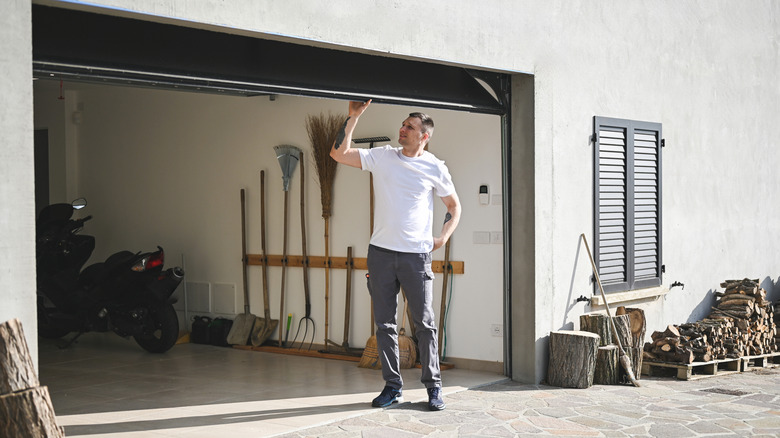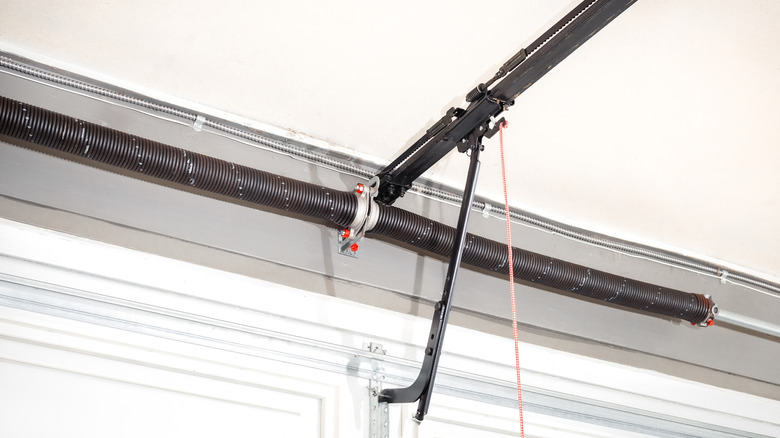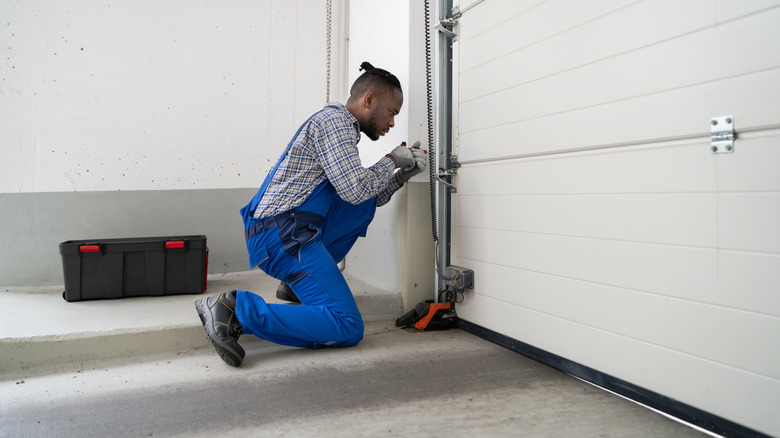Why Your Garage Door Keeps Making Noise (And How To Fix It)
Your garage door is one of those parts of your home that you don't think about much until there is an issue with it. Fortunately, garage doors have an fairly obvious way of letting you know they need some attention and care before breaking: They make a bunch of noise. Squeaks and rattles so loud that even your neighbors can hear them is a big clue that there is a problem and you need to take a moment to find the source and fix it. Many issues can be solved with a DIY approach, but there are others you may need to call in the pros for.
Excessive garage door noise isn't normal; they are supposed to open and close relatively quietly (with minimal but consistent noise). If yours is making a ton of squeaking or squealing noises, it's likely that one of its moving parts simply needs to be oiled. If the noise sounds more like vibrating or rattling, that may indicate that some bolts or nuts have come loose and need to be re-tightened. And while a whirring sound means the motor likely requires some attention, banging noises generally mean there is an issue with the door itself.
Identify and resolve the noise
It's one thing to notice that your garage door is being noisy. It's another thing entirely to figure out where specifically that noise is coming from, and you will probably need a little trial and error to pinpoint it exactly. If the noise is especially loud when inside your garage, as they are typically big, bare rooms, we recommend stepping just outside the door, closing it, then trying to peg down the noise. Feel free to open and close it a few times if you don't think it will cause any damage. By then it should (hopefully) be more clear what needs attention.
Once you have figured out what needs to be done — like if you realized you just need to learn how to fix your garage door that is opening too slowly — the next step is to get the door and your tools ready to start the repairs. Regardless of whether you have a manual or motor-driven garage door, close it, ensure it's locked, then cut off the electricity to it during this process to avoid any unintentional movements or danger.
If you are wondering how to tune up a moving part, it likely needs lubricating, so be sure to grab either a silicone-based or white lithium grease for the task (not WD-40). Apply it to all the rollers, hinges, and springs across the frame and panels, and make sure you know how often you should be lubricating your garage door springs for future maintenance. Dealing with loose bolts and nuts is even easier; grab a socket wrench and crank, but don't overtighten or strip them.
When to call a professional
You should be able to take care of basic repairs on your own as long as you don't forget these important steps during garage door maintenance. Sometimes, however, there are issues big and complicated enough that a knowledgeable professional needs to step in to handle them. For example, if you tightened or lubricated a garage door part on your own but the issue is persisting, this most likely means that there is a larger problem like an unbalanced door or a worn out motor. At this point, only a professional can resolve the issue.
Garage doors are enormous, heavy, and full of little moving parts, and handling them beyond routine maintenance requires knowledge and tools only a pro will have. Bigger issues can cause physical injury as well as damage to the door or your home, so it's best to let a professional deal with it.
Fortunately, licensed garage door professionals are not terribly expensive to call up. Most repairs will only run you around $150 to $400, though a full replacement can cost up to $1,500 on average. While you can likely take care of basic issues and routine maintenance on your own, leaving the heavy lifting to the professionals is a better way to guarantee quality results.


